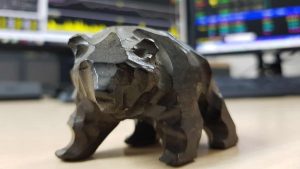I asked ChatGPT for the date of the AI stock market crash


Every man and his dog seems to be mentioning an upcoming stock market crash these days. The CEO of JP Morgan, Jaimie Dimon, spoke about his worries in an interview with the BBC. And the Bank of England warned of a possible “sharp correction” thanks to AI-related stock valuations.
How serious are these warnings? And where better to find the answer than straight from the source? Maybe we need AI to predict an AI stock market crash. I asked ChatGPT: “How serious are the concerns about an upcoming stock market crash because of AI? And when might it happen?”
Moderate-to-high
Before breaking down the response, it’s worth highlighting the unreliability of these large language models. Current AI is programmed to, among other things, tell the user what it thinks it wants to hear. Such a lack of concern for accuracy is not conducive to good stock market research. Therefore I take everything ChatGPT tells me with a supermassive grain of salt.
That said, the answer this time was drawn from specific sources, which I liked. It mentioned the MIT study that reported that 95% of organisations trying to use AI profitably failed to make a return on investment. It also quoted the CEO of Goldman Sachs who recently said he âwouldnât be surprised if in the next 12 to 24 months we see a draw-down with respect to equity marketsâ.
Given this evidence, ChatGPT’s concluding answers was: “A plausible window is within the next one to two years â meaning sometime in 2026-2027 or possibly late 2025 â depending on triggers. But this is not a guarantee.” It also mentioned a “moderate to high” chance of a “meaningful correction of 30-50%” in that timeframe.
Just for fun, I did ask ChatGPT to take a stab at the date of a possible AI stock market crash. It played along with the “crystal ball game” and went for a “cheeky” speculative date of “Wednesday, September 17, 2026”.
Goings on
Whether an AI stock market crash comes on that date or not, I’m following investing principles that have stood the test of time. One of these, diversification, means I’ll never be overly exposed to a sector correction. It’s also one of the tips ChatGPT suggested in its answer.
One stock I hold and believe investors I think could consider for a diversified portfolio is Diageo (LSE: DGE). The firm is trading at 14 times forward earnings. That’s cheaper than the FTSE 100 average and very much cheaper than many tech stocks at present. A more reasonable valuation means there’s less room for the shares to fall, although they’ve already fallen sharply in recent periods.
It’s true that there’s pessimism around the drinks manufacturer at present. The introduction of weight loss drugs could be making people drink less alcohol. A generational shift away from beers and spirits might mean the youth of today won’t spend as much on alcohol as previous cohorts did.
If we’re in for some economic turbulence however, I expect Diageo will be one of the more insulated companies on the FTSE 100. Alcohol tends to thrive during recessions. And it’s far removed from any goings on in the AI sector.
The post I asked ChatGPT for the date of the AI stock market crash appeared first on The Motley Fool UK.
Should you invest £1,000 in Diageo plc right now?
When investing expert Mark Rogers has a stock tip, it can pay to listen. After all, the flagship Motley Fool Share Advisor newsletter he has run for nearly a decade has provided thousands of paying members with top stock recommendations from the UK and US markets.
And right now, Mark thinks there are 6 standout stocks that investors should consider buying. Want to see if Diageo plc made the list?
More reading
- After falling 30% this year, should I consider putting beaten-down Diageo shares in my ISA?
- Down 29%, are Diageo shares â and their 4.4% dividend yield â worth the risk?
- Can anything save the Diageo share price?
- Down 50% to a 10-year low, the Diageo share price is driving me to drink!
- Thank goodness I didn’t buy £5,000 of Diageo shares 4 years ago!
John Fieldsend has positions in Diageo Plc. The Motley Fool UK has recommended Diageo Plc. Views expressed on the companies mentioned in this article are those of the writer and therefore may differ from the official recommendations we make in our subscription services such as Share Advisor, Hidden Winners and Pro. Here at The Motley Fool we believe that considering a diverse range of insights makes us better investors.





